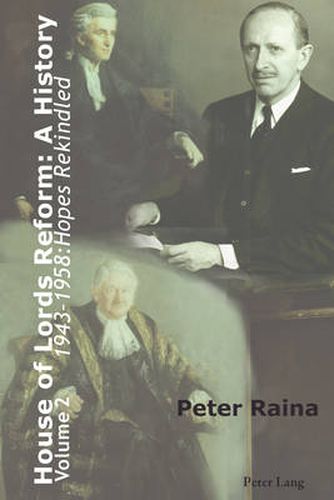Readings Newsletter
Become a Readings Member to make your shopping experience even easier.
Sign in or sign up for free!
You’re not far away from qualifying for FREE standard shipping within Australia
You’ve qualified for FREE standard shipping within Australia
The cart is loading…






This title is printed to order. This book may have been self-published. If so, we cannot guarantee the quality of the content. In the main most books will have gone through the editing process however some may not. We therefore suggest that you be aware of this before ordering this book. If in doubt check either the author or publisher’s details as we are unable to accept any returns unless they are faulty. Please contact us if you have any questions.
Peter Raina’s House of Lords Reform recounts the long struggle to bring an ancient institution up to date. The first volume ended in 1937, as crisis overwhelmed Europe. Reform issues were not forgotten, however. This second volume continues the story, presenting a wealth of illuminating records, a great many of them published here for the first time.
The 4th Marquess of Salisbury planned changes to the Lords even before the war’s end. Further proposals followed after the establishment of the Labour government in 1945. Fearful that its legislation would be blocked, Labour amended the Parliament Act, 1911 to limit the Lords’ delaying powers to just one year. Some believed the Upper House would disappear altogether.
Salisbury’s heir worked hard for preservation, and managed to secure an all-party conference. Its complex schemes and animated discussions are all presented here in original documents. Though the conference failed, Lords Reading, Exeter and Simon continued the effort, with ideas that would eventually bear fruit. They championed the rights of women, self-regulation through standing orders, and the creation of life peers. The Churchill government formed a Lords Reform Committee but could get no further. Then, in an unexpected twist, the cause finally triumphed when Harold Macmillan and the Earl of Home got a one-clause bill through parliament in 1958. The Life Peers Act transformed the nature of British politics.
$9.00 standard shipping within Australia
FREE standard shipping within Australia for orders over $100.00
Express & International shipping calculated at checkout
This title is printed to order. This book may have been self-published. If so, we cannot guarantee the quality of the content. In the main most books will have gone through the editing process however some may not. We therefore suggest that you be aware of this before ordering this book. If in doubt check either the author or publisher’s details as we are unable to accept any returns unless they are faulty. Please contact us if you have any questions.
Peter Raina’s House of Lords Reform recounts the long struggle to bring an ancient institution up to date. The first volume ended in 1937, as crisis overwhelmed Europe. Reform issues were not forgotten, however. This second volume continues the story, presenting a wealth of illuminating records, a great many of them published here for the first time.
The 4th Marquess of Salisbury planned changes to the Lords even before the war’s end. Further proposals followed after the establishment of the Labour government in 1945. Fearful that its legislation would be blocked, Labour amended the Parliament Act, 1911 to limit the Lords’ delaying powers to just one year. Some believed the Upper House would disappear altogether.
Salisbury’s heir worked hard for preservation, and managed to secure an all-party conference. Its complex schemes and animated discussions are all presented here in original documents. Though the conference failed, Lords Reading, Exeter and Simon continued the effort, with ideas that would eventually bear fruit. They championed the rights of women, self-regulation through standing orders, and the creation of life peers. The Churchill government formed a Lords Reform Committee but could get no further. Then, in an unexpected twist, the cause finally triumphed when Harold Macmillan and the Earl of Home got a one-clause bill through parliament in 1958. The Life Peers Act transformed the nature of British politics.